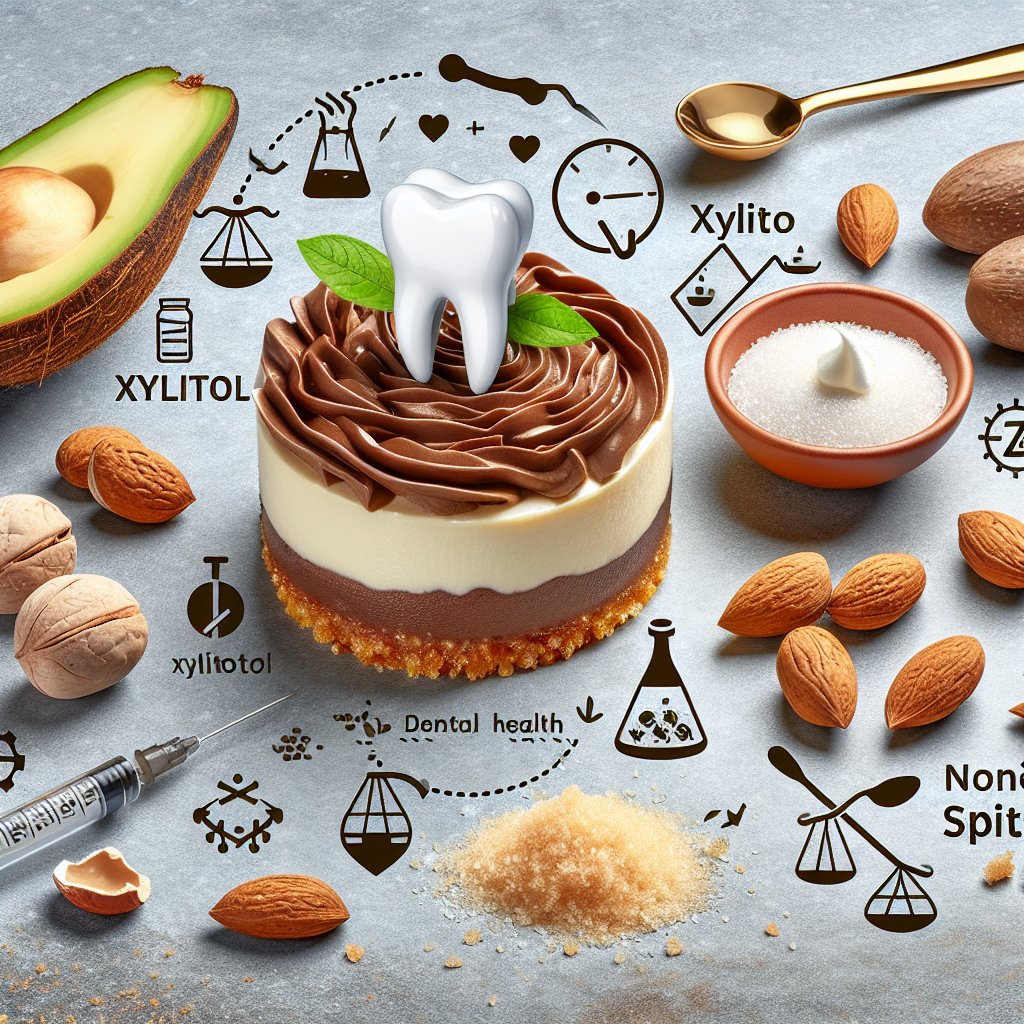Is Xylitol Keto-Worthy? Unveiling the Secret Behind Xylitol’s Rise in the Popular Keto Diet Craze!
Why is the Keto Diet So Popular?
Before we dive into the world of xylitol, let’s talk about the keto diet’s skyrocketing popularity. With its emphasis on low-carb, high-fat eating, the ketogenic diet has captured the attention of health enthusiasts worldwide. The keto diet aims to put the body in a state of ketosis, where it burns fat for fuel instead of carbohydrates, leading to weight loss and numerous health benefits 1.
Many people have found success in shedding excess pounds, improving their energy levels, and even managing certain health conditions by following the principles of the keto diet. The appeal of indulging in rich, satisfying foods while still experiencing the benefits of weight loss has undoubtedly contributed to the diet’s widespread appeal.
The Allure of Xylitol as a Sugar Substitute
One of the pillars of the keto diet is minimizing sugar intake, which has led to a surge in interest around alternative sweeteners. Xylitol, in particular, has gained popularity as a sugar substitute in the keto community. Derived from birch bark or corn, xylitol presents a sweet flavor without causing the spike in blood sugar levels associated with regular sugar consumption2.
Furthermore, xylitol has a negligible effect on insulin levels, making it a favorable choice for those following a ketogenic lifestyle. Its low glycemic index means it has little to no impact on blood sugar and insulin levels, aligning perfectly with the goals of the keto diet3.

What is Xylitol?
Xylitol is a sugar alcohol that is commonly used as a sugar substitute. It occurs naturally in small amounts in fibrous fruits and vegetables, trees, corncobs, and even in the human body. Xylitol is known for its sweetness, similar to sugar, but with fewer calories. It has gained popularity as a sweetener in the ketogenic diet community due to its low glycemic index and minimal impact on blood sugar levels.
One of the most appealing properties of xylitol is that it doesn’t spike blood sugar or insulin levels, making it a suitable option for those following a ketogenic lifestyle. Additionally, xylitol has been found to have dental benefits, as it can help prevent the growth of harmful bacteria in the mouth, reducing the risk of cavities and dental decay. This natural sweetener is also low in carbohydrates, making it an attractive choice for those looking to maintain ketosis while still enjoying a hint of sweetness in their diet.
Keto Diet Overview
Hey there, ketogenic diet enthusiasts! Let’s dive into the key principles of the keto diet, which has been making waves in the health and wellness world. The keto diet is all about transforming your body into a fat-burning powerhouse through a low-carb, high-fat eating approach.
Research has shown that following a keto diet can lead to various health benefits, such as weight loss, improved blood sugar control, and enhanced mental clarity. The diet works by drastically reducing carbohydrate intake and replacing it with healthy fats, which induces a metabolic state called ketosis.
During ketosis, the body becomes incredibly efficient at burning fat for energy. As a result, many individuals on the keto diet experience significant weight loss and improved energy levels.
By focusing on consuming foods that are low in carbohydrates but high in healthy fats, such as avocados, nuts, seeds, and olive oil, the keto diet aims to shift the body’s primary fuel source from glucose to ketones, which are produced from fat in the liver.
Is Xylitol Keto-Worthy? Unveiling the Secret Behind Xylitol’s Rise in the Popular Keto Diet Craze!
Xylitol on Keto: How Suitable is it?
When it comes to the keto diet, sweeteners can be a bit of a grey area. Many people wonder whether xylitol is a suitable sweetener for the ketogenic lifestyle. Let’s dive into the science and find out!
Firstly, the suitability of xylitol for the keto diet lies in its impact on ketosis and blood sugar levels. Research indicates that xylitol does not spike blood sugar or insulin levels, making it a potentially suitable sweetener for those following a ketogenic diet.
A study published in the European Journal of Clinical Nutrition found that xylitol has a negligible effect on glucose and insulin levels, making it an attractive option for those looking to maintain ketosis.
Furthermore, xylitol has a very low glycemic index (GI), meaning it has minimal impact on blood sugar levels. This is particularly important for individuals on the keto diet as they aim to keep their blood sugar levels stable to stay in ketosis.
With its minimal impact on blood sugar and insulin levels, it seems that xylitol can indeed be considered keto-worthy.
Exploring the Potential Benefits of Xylitol for Keto Dieters
As a keto enthusiast, you’re always on the lookout for sweeteners that won’t kick you out of ketosis. One such sweetener that has gained popularity in the keto community is xylitol. But is xylitol keto-worthy? Let’s uncover the secret behind xylitol’s rise in the popular keto diet craze!
Xylitol is a natural sugar alcohol found in many fruits and vegetables. One of the most significant benefits of xylitol for keto dieters is its low glycemic index. This means that it has little to no effect on blood sugar and insulin levels, making it a suitable sweetener for those following a ketogenic lifestyle. Research has shown that xylitol can help maintain stable blood sugar levels, which is crucial for anyone on a keto diet.
Moreover, xylitol has been linked to improved dental health. It can help prevent cavities and reduce the risk of tooth decay. This is a particularly valuable benefit for those on a keto diet, as they may consume fewer sugary foods that can be detrimental to dental health.

Concerns and Considerations
While xylitol can be a great addition to a keto diet, there are some potential drawbacks and side effects to be aware of. It’s important to approach this sweetener with caution and moderation, particularly if you are new to using it.
Impact on Blood Sugar and Insulin Levels
One of the primary concerns with xylitol is its impact on blood sugar levels. While it has a minimal effect on blood sugar and insulin levels for most people, some individuals may experience spikes in blood sugar after consuming xylitol. This can potentially interfere with ketosis, the metabolic state essential for a keto diet.
Given that the goal of a keto diet is to keep blood sugar levels low, it’s important to monitor your body’s response to xylitol. If you notice any negative effects, consider reducing or eliminating its use to maintain your keto goals.
Gastrointestinal Distress
Another consideration is the potential for gastrointestinal distress. Xylitol can have a laxative effect, leading to bloating, gas, and diarrhea, especially when consumed in large amounts. It’s recommended to start with small doses and gradually increase as your body adjusts to minimize these potential side effects.
It’s also essential to stay well-hydrated when consuming xylitol to help prevent gastrointestinal discomfort.
Overall, while xylitol can be a keto-friendly sweetener for many people, it’s crucial to be mindful of its potential impact on blood sugar, insulin levels, and gastrointestinal function. Paying attention to your body’s response and using xylitol in moderation can help you enjoy its sweetness while staying on track with your keto lifestyle.
Alternatives to Xylitol
While xylitol is a popular sweetener in the keto community, it may not be suitable for everyone due to its potential digestive effects. The good news is that there are several alternative keto-friendly sweeteners that you can use to replace xylitol in your recipes.
Erythritol
Erythritol is a sugar alcohol that contains zero net carbs, making it an excellent choice for the ketogenic diet. It’s well-tolerated by most people and does not cause digestive upset, unlike xylitol. When substituting xylitol with erythritol in recipes, keep in mind that it is 70% as sweet as sugar, so you may need to adjust the quantities accordingly.
Stevia
Stevia is a natural sweetener derived from the leaves of the stevia plant. It has zero calories and zero carbohydrates, making it an ideal sugar substitute for those following a keto lifestyle. However, some people find that stevia has a slightly bitter aftertaste, so it’s best used in combination with other sweeteners or in recipes where the aftertaste is less noticeable.
Monk Fruit Sweetener
Monk fruit sweetener is derived from the extract of the monk fruit and contains zero calories and zero carbohydrates. It has been used in traditional Chinese medicine for centuries and is considered a natural, keto-friendly sweetener. It is much sweeter than sugar, so a small amount goes a long way in recipes.
Overall, these alternative sweeteners provide keto-friendly options for those who are looking to avoid or replace xylitol in their diet, allowing for a versatile range of choices to suit various preferences and dietary needs.
Is Xylitol Keto-Worthy? Unveiling the Secret Behind Xylitol’s Rise in the Popular Keto Diet Craze!
Conclusion
After delving into the world of xylitol and its impact on the ketogenic diet, it’s clear that this natural sweetener indeed has keto-worthy potential. With its significantly lower glycemic index compared to sugar, xylitol is a great alternative for those following a ketogenic lifestyle. It doesn’t cause a spike in blood sugar levels, making it a favorable choice for maintaining ketosis.
Research has shown that xylitol not only has minimal impact on insulin levels but also boasts dental and health benefits. Its ability to inhibit the growth of bacteria and reduce the risk of cavities makes it an attractive sugar substitute, especially for those on a low-carb diet.
However, it’s important to remember that xylitol, like any other sweetener, should be consumed in moderation. Excessive intake can lead to digestive discomfort, especially for individuals with sensitive stomachs.
Final Recommendation
Considering its low glycemic index, dental benefits, and minimal impact on insulin levels, using xylitol as a sweetener on a keto diet can be a smart choice. It allows for a touch of sweetness without sabotaging your efforts to stay in ketosis.
Just be mindful of the quantity you consume and how your body responds to it. Incorporating xylitol into your keto-friendly recipes in a balanced and controlled manner can enhance your overall experience on the ketogenic diet.


